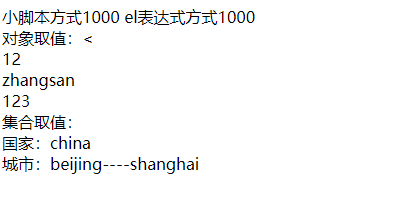一.概述
EL的全称是Expression Language,EL定义了一系列的隐含对象和操作符,使开发人员能够很方便地访问页面的上下文,以及不同作用域内的对象,而无需在JSP页面嵌入Java代码。 EL表达式提供了在Java代码之外,访问和处理应用程序数据的功能,通常用于在某个作用域(page、request、session、application等)内取得属性值,或者做简单的运算和判断。EL表达式有如下特点。 (1) 自动类型转换 (2) 使用简单
二.语法
EL表达式以“${”开始,以“}”结尾,语法如下: ${ EL expression } EL提供“.”和“[]”两种运算符来存取数据。 (1) 点操作符,例如:${admin.loginName} (2) []操作符,例如:${ admin["loginName"]} 当属性名中包含了特殊字符如“.”或“—”等的情况下,就不能使用点操作符来访问,这时只能使用“[]”操作符。 访问数组,如果有一个对象名为array的数组,那么我们可以根据索引值来访问其中的元素,如${array[0]}、${array[1]}等。
jsp中提供了EL隐式对象可以是一下几类:
|
类别 |
对象标识符 |
作 用 |
|
JSP隐式对象 |
pageContext |
提供对页面信息和JSP内置对象的访问 |
|
作用域访问对象 |
pageScope |
与页面作用域page中的属性相关联的Map类 |
|
requestScope |
与请求作用域request中的属性相关联的Map类 |
|
|
sessionScope |
与会话作用域session中的属性相关联的Map类 |
|
|
applicationScope |
与应用程序作用域application中的属性相关联的Map类 |
|
|
参数访问对象 |
param |
按照参数名称访问单一请求值得Map对象 |
|
paramValues |
按照参数名称访问数组请求值得Map对象 |
|
|
请求头访问对象 |
header |
与请求头名称相对应的字符串的Map集合 |
|
headerValues |
与请求头名称相对应的字符串数组的Map集合 |
|
|
cookie |
所有cookie组成的Map集合 |
|
|
初始化参数对象 |
initParam |
Web应用程序上下文初始化参数的Map集合 |
三.代码演示
AdminServler:
@WebServlet("/AdminServlet")
public class AdminServlet extends HttpServlet {
protected void doPost(HttpServletRequest request, HttpServletResponse response) throws ServletException, IOException {
request.setCharacterEncoding("utf-8");
response.setContentType("text/html;charset=utf-8");
//单个值
adminService adminService = new adminServiceImpl();
int maxId = adminService.getMaxId();
request.setAttribute("maxId",maxId);
//对象
HttpSession session = request.getSession();
Admin admin = new Admin(12,"zhangsan","123");
session.setAttribute("admin",admin);
//集合 map
HashMap countries = new HashMap();
countries.put("CN","china");
countries.put("UK","English");
countries.put("USA","American");
request.setAttribute("countries",countries);
// 集合 list
List cities = new ArrayList();
cities.add(0,"beijing");
cities.add("shanghai");
request.setAttribute("cities",cities);
request.getRequestDispatcher("EL.jsp").forward(request,response);
}
protected void doGet(HttpServletRequest request, HttpServletResponse response) throws ServletException, IOException {
doPost(request,response);
}
}
jsp:
<%@ page language="java" contentType="text/html; charset=UTF-8"
pageEncoding="UTF-8" %>
<!DOCTYPE html PUBLIC "-//W3C//DTD HTML 4.01 Transitional//EN" "http://www.w3.org/TR/html4/loose.dtd">
<html>
<head>
<meta http-equiv="Content-Type" content="text/html; charset=UTF-8">
<title>Insert title here</title>
</head>
<body>
<%
int maxId = (int)request.getAttribute("maxId");
Admin admin = (Admin)session.getAttribute("admin");
%>
小脚本方式<%=maxId%>
el表达式方式${requestScope.maxId}<br>
对象取值:<<br>
${sessionScope.admin.id}<br>
${sessionScope.admin.loginName}<br>
${sessionScope.admin.loginPwd}<br>
集合取值:<br>
国家:${requestScope.countries.CN}<br>
城市:${requestScope.cities[0]}----${requestScope.cities[1]}
</body>
</html>